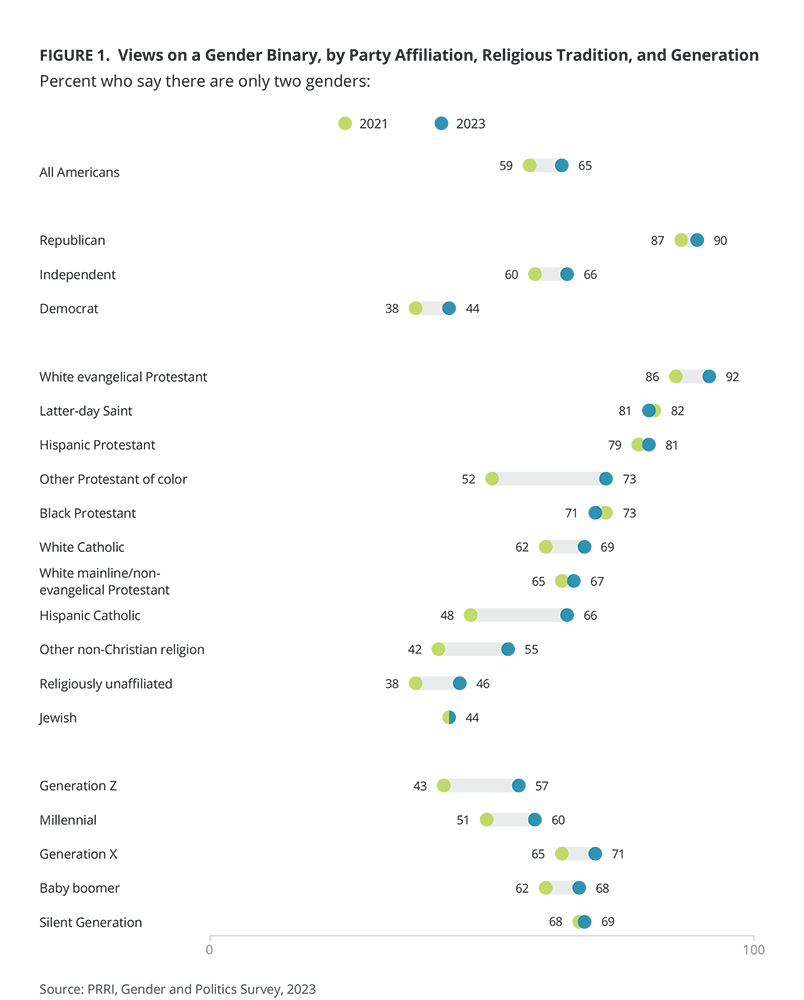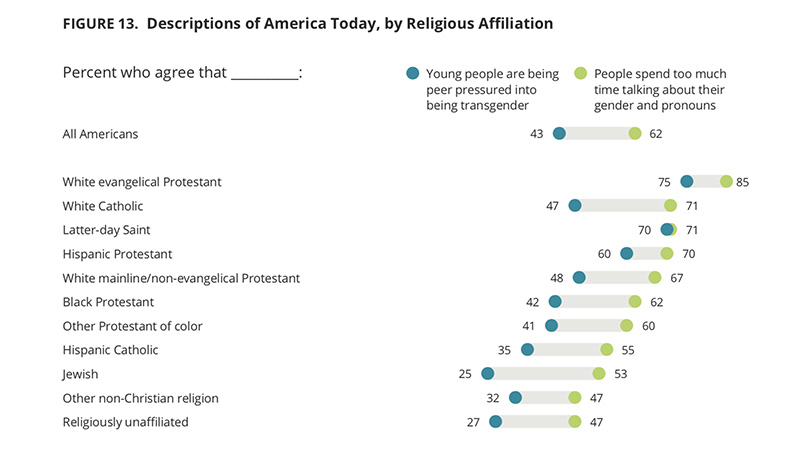
(RNS) — Restricting transgender rights has become the rallying cry for Republicans and a good share of religious conservatives over the past two years, and a new survey shows it is having an impact.
A Public Religion Research Institute survey of 5,438 Americans shows an increase over the past two years in the belief that there are only two gender identities — man and woman — among several religious groups.
Predictably, white evangelicals who data show hold the strongest conservative beliefs grew more steadfast on the issue in the past two years; 92% said there are only two genders, up from 86% in 2021.
But majorities of other religious groups are also less accepting of trans identities.
Hispanic Catholics led the charge. The survey shows 66% of Hispanic Catholics believe there are only two genders — up from 48% in 2021.
Majorities of other non-Christian religious Americans, including Muslims, Buddhists, Hindus and even Unitarian Universalists likewise say there are only two genders.
About 65% of Americans overall, up from 59% two years ago, say there are only two genders.

“Views on a Gender Binary, by Party Affiliation, Religious Tradition, and Generation” Graphic courtesy PRRI
“We see a hardening of views about the gender binary across many groups and people of faith,”said Melissa Deckman, PRRI’s chief executive. “This is still a concept that’s very new to a lot of people, especially older Americans, who tend to be people of faith.”
RELATED: Bishops discourage Catholic health care groups from performing gender-affirming care
More than 500 anti-LGBTQ bills have been introduced across state legislatures this year. About 80 have passed. Nineteen states now have laws limiting medical treatments such as puberty blockers, hormone replacement therapy and surgeries for trans youth.
Louisiana may be the 20th. On Wednesday (June 7), Louisiana lawmakers voted to ban minors from access to gender-transition care. (Gov. John Bel Edwards has yet to sign the bill, but even if he vetoes it the Republican-controlled legislature can override it.)
Other states have banned trans females from participating in girls’ or women’s sports teams or prohibited public school teachers from using students’ preferred pronouns if pronouns don’t match up with students’ born sex.
The pace of legislation targeting trans people has stunned the LGBTQ community across the spectrum.
Not only trans youth are targeted. In April, Montana state Rep. Zooey Zephyr, the state’s first transgender lawmaker, was censured by the House’s GOP majority and barred from the chamber floor for the remainder of the legislative session. She has sued.
This week, the Human Rights Campaign, the country’s largest LGBTQ advocacy group, declared a state of emergency for the queer and trans community, the first time it has ever done so.
“The multiplying threats facing millions in our community are not just perceived — they are real, tangible and dangerous,” Kelley Robinson, the group’s CEO, said in a statement.
One of the reasons for the growing discomfort with trans Americans may be that few know them. The PRRI study found that only 11% of Americans said they knew someone who was transgender and only 13% said they knew someone who uses a gender neutral pronoun. By contrast, 51% said they knew someone who was gay.
White evangelicals were the least likely of all religious groups to report they would be comfortable learning that a friend is in a same-sex relationship (29%) or is transgender (22%). By contrast, 65% of American Jews said they would be comfortable learning a friend is transgender, followed by 53% of unaffiliated Americans and 43% of other non-Christian religious Americans.
The survey also found Republicans and white evangelicals were most likely to oppose teaching about gender identity in public schools.
But a majority of Americans think it is appropriate for schools to provide comprehensive sex education beginning in middle school that includes explanations of birth control pills, condoms and other forms of contraception. Only 8% of Americans said it was never appropriate to teach or discuss sex ed in public K-12 schools.

“Descriptions of America Today, by Religious Affiliation” Graphic courtesy PRRI (Cropped by RNS)
Neither do most Americans think young people are pressured into being transgender. Here too, conservative Christians are the exception.
White evangelicals (75%), Latter-day Saints (70%) and Hispanic Protestants (60%) are the only religious groups in which majorities of adherents say young people are being peer pressured into being transgender.
Restrictions on transgender people will likely feature prominently in the 2024 presidential election.The two leading Republican presidential contenders, former President Donald Trump and Gov. Ron DeSantis of Florida, have supported measures curtailing transgender rights.
“There’s been an assumption that there’s a forward trajectory — that people are more accepting and inclusive of people with gender differences, especially since we’ve seen a lot of support for nondiscrimination laws or same-sex marriage,” said Deckman. “You would assume people are more progressive on the issue, but there’s still a reluctance to grapple with the idea that gender is more than male and female.”
The margin of error for the survey, conducted March 9-23, 2023, was plus or minus 1.5 percentage points.
RELATED: UMC clergy reportedly face complaint, church trial after marrying nonbinary couple
